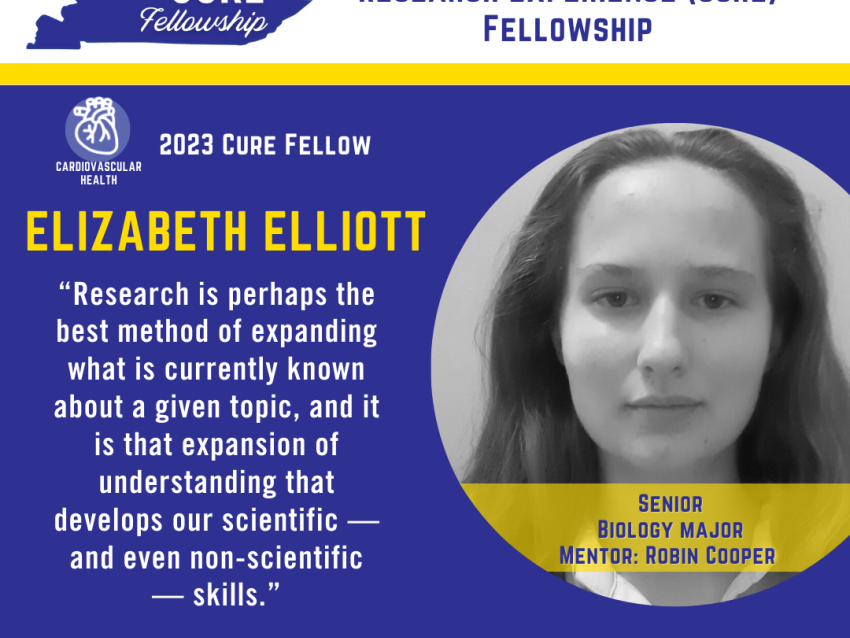
Elizabeth Elliott 2023 CURE Fellow
Elizabeth Elliott
Senior, Biology major and a 2023 Cardiovascular Health RPA CURE Fellow
Research Mentor: Dr. Robin Cooper
Supported by the Cardiovascular Health Research Priority Area
How will this summer research fellowship support your research efforts?
“This scholarship is a great boon. While I do have a scholarship that covers college tuition, it doesn’t cover the other baseline college expenses (e.g. school fees, textbooks, lab costs, etc.) or other types of cost-of-living; had I not secured some kind of funding for the semester, I’d have needed to take up a job that would’ve limited how much research I could do and meant I couldn’t invest as much time in assisting Dr. Cooper. Having this fellowship makes it easier for me to afford carrying out research. Additionally, the fellowship comes with rather a large number of networking opportunities, such as the USTiCR program and the socials spread throughout the summer; all of this means that I am able to learn more about other kinds of research/projects, which in turn expands my understanding of my own research, as well as opening new doors via cross-discipline studies.”
Why is research important?
“I find research important on two main levels: the professional and the personal. For the former: research is perhaps the best method of expanding what is currently known about a given topic, and it is that expansion of understanding that develops our scientific — and even non-scientific — skills. Without research, much of our medical procedures wouldn’t exist as effectively as they do today; similarly, much of our understanding of physics, history, the arts, and similar disciplines would suffer as well. For the latter: conducting research helps develop an individual’s skills and experiences very well. Working in a research context is extremely hands-on, which means that students develop practical experience, think for themselves on how to handle non-textbook situations, and get practice in designing, executing, and expanding experiments. Additionally, seeing real-life applications for learned concepts can help deepen understanding, since it allows students to connect the abstract ideas to the concrete implementation. All of this renders research exceedingly important, and student engagement in research even more so.”
What advice would you give to other UK students thinking about doing research?
“I would first recommend that UK students thinking about engaging in research try to resist being intimidated by college-level research. When I first started in this kind of pursuit, I found the entire premise a touch daunting, as this kind of research felt too dry, dusty, and advanced for a novice like myself. Only once I bit the bullet and started working in a lab did I realize that research is much different: less a concerningly difficult set-up for failure and more a communal effort to learn. I’d also advise that UK students not hesitate to reach out to mentors, but also that they consider a mentor’s research field when doing so; having complete ignorance of a mentor’s field can only be bad, as it leaves open the possibility that a student won’t like the research they commit to helping with and sends the message that the student doesn’t care about the mentor’s work. I would definitely suggest reading mentors’ web pages (should they exist) or ForagerOne profiles to investigate recently published articles. This especially might help indicate what depth of understanding or personal background reading might be needed on a given topic. Finally, I’d recommend that students reach out to other student researchers to hear about the experience; jumping into research with both feet but no understanding of what one is getting into is similarly inadvisable to not knowing what field one is entering.”